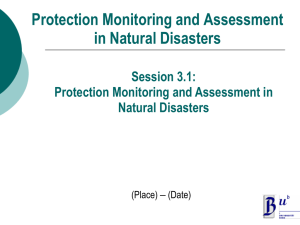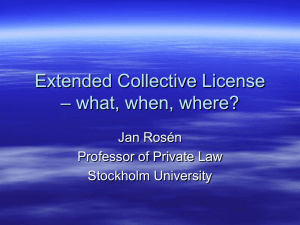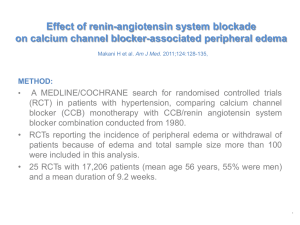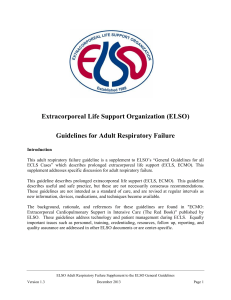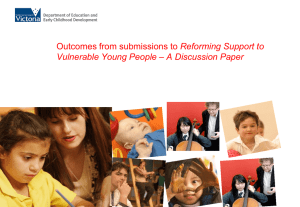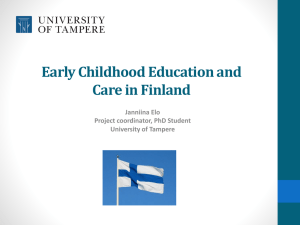NSW Far North Coast Early Childhood Educators
advertisement
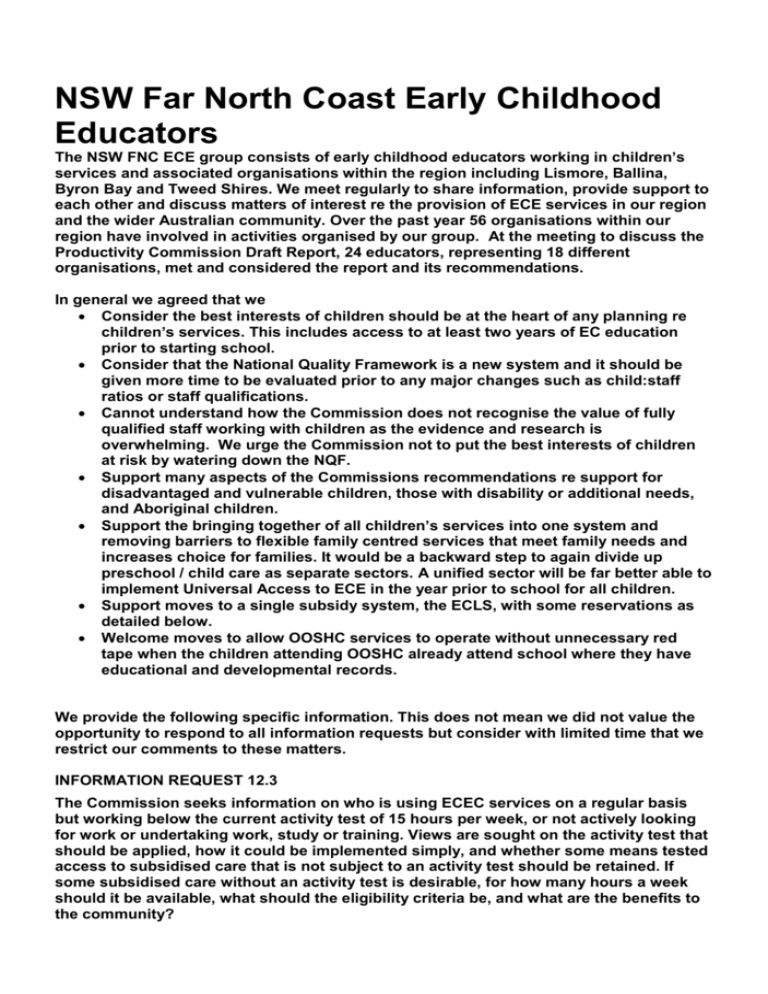
NSW Far North Coast Early Childhood Educators The NSW FNC ECE group consists of early childhood educators working in children’s services and associated organisations within the region including Lismore, Ballina, Byron Bay and Tweed Shires. We meet regularly to share information, provide support to each other and discuss matters of interest re the provision of ECE services in our region and the wider Australian community. Over the past year 56 organisations within our region have involved in activities organised by our group. At the meeting to discuss the Productivity Commission Draft Report, 24 educators, representing 18 different organisations, met and considered the report and its recommendations. In general we agreed that we Consider the best interests of children should be at the heart of any planning re children’s services. This includes access to at least two years of EC education prior to starting school. Consider that the National Quality Framework is a new system and it should be given more time to be evaluated prior to any major changes such as child:staff ratios or staff qualifications. Cannot understand how the Commission does not recognise the value of fully qualified staff working with children as the evidence and research is overwhelming. We urge the Commission not to put the best interests of children at risk by watering down the NQF. Support many aspects of the Commissions recommendations re support for disadvantaged and vulnerable children, those with disability or additional needs, and Aboriginal children. Support the bringing together of all children’s services into one system and removing barriers to flexible family centred services that meet family needs and increases choice for families. It would be a backward step to again divide up preschool / child care as separate sectors. A unified sector will be far better able to implement Universal Access to ECE in the year prior to school for all children. Support moves to a single subsidy system, the ECLS, with some reservations as detailed below. Welcome moves to allow OOSHC services to operate without unnecessary red tape when the children attending OOSHC already attend school where they have educational and developmental records. We provide the following specific information. This does not mean we did not value the opportunity to respond to all information requests but consider with limited time that we restrict our comments to these matters. INFORMATION REQUEST 12.3 The Commission seeks information on who is using ECEC services on a regular basis but working below the current activity test of 15 hours per week, or not actively looking for work or undertaking work, study or training. Views are sought on the activity test that should be applied, how it could be implemented simply, and whether some means tested access to subsidised care that is not subject to an activity test should be retained. If some subsidised care without an activity test is desirable, for how many hours a week should it be available, what should the eligibility criteria be, and what are the benefits to the community? INFORMATION REQUEST 12.9 The Commission seeks information on whether there are other groups of children that are developmentally vulnerable, how they can be identified, and what the best way is to meet their additional needs. We consider that the Commission should take a broader view of the notion of supporting workforce participation. Many families go through difficult periods when their family or personal life is stressed and they may drop out of the workforce for a period. Many families of very young children go through such difficult periods and in that case those very young children are at risk of being “at risk”. During that period of stress, access to children’s services can be one vital part of the factors that allow a family to “get its act together”. The parents will then be able to return to the workforce and the children’s learning and development and safety can return to normal. In contrast if the Productivity Commission’s recommendations are implemented, at the point when the family are at its lowest and the parent or parents caring for the young children are unable to work, they will also effectively lose access to children’s services as they will not be eligible for ECLS. The loss of the support of the children’s service may be a tipping point that truly puts those children in the at risk category. The Commission’s report seems to understand this point in that it has recognised the dangers in disadvantaged communities and recommended funding or services and family supports being in place. However there are vulnerable families in all communities not just in isolated or Aboriginal communities. We see many families in our area who are struggling in this way with very young children. In our child care centres there are families who have newly moved to the area, often fleeing problems ( drug and alcohol, mental illness, domestic violence, abuse, etc) from their previous location. Many young parents are in single parent families and have very recently had a relationship breakdown. Many families cannot provide their children’s service with an alternative emergency contact as they have no family, no friends in the area and have not yet developed a relationship with neighbours. Many parents move frequently, unable to organise a stable home. Many have transport problems as they cannot afford a car and their is limited public transport. Many, if they can get any work, are in casual work which is unpredictable and varies with the seasons. Many of these young parents have depression and need support. Many report their children only get to play with other children when they are at a children’s service. In all these cases the current children’s services system provides a great deal of support. Firstly the parent can get access for their child to attend a children’s service. This allows respite for a non-working parent, and it allows them to undertake the tasks they need to try to restore normality to their lives. The organise transport, to do housework, to organise a more permanent home, to attend appointments ( medical, legal, Centrelink, TAFE, etc) that are necessary. For these families having the current 24 hours per week CCB allows them to afford a day or two child care each week the get their lives back on track. In some cases they work just one day per week or just two or three short days as that is all they can mange at the moment, (and as such would not pass the proposed threshold of at least 12 hours work per week. The access to child care provides their children with those couple of days in a service with caring staff, peer contact they so need for optimal learning and development . the current SCCB Temporary Financial Hardship is also often vital to allow that parent to get over the worst of their financial upheaval The child’s attendance at a children’s service plays a vital role in allowing qualified ECEC staff to make assessments of their learning and to make referrals for those children who need it. Very often because of the stressed and unsettled life these children will be at risk with the normality of a day or two in a children’s service each week. Our community will pay far more later on to provide intervention in the lives of these children if we cut off their access to children’s services now. Of families using our services our estimate is that around 10-15% have only 24 hours CCB access at the moment and so will have a parent who would not pass the activity test. Of those maybe half (5-7% of all families using child care) will be on higher family incomes. They currently get no CCR and little or no CCB and will not be eligible for ECLS and its availability or otherwise will not affect them. The other half will be on very low incomes and have predominantly 100% CCB but no CCR eligibility. These families will mostly not be eligible for ECLS as they will not meet the 12 hour per week activity test. It is among those families we will know there are many families and children at risk. We recommend that 1. Non working families be able to retain access to ECLS on the basis of a more flexible activity test. We consider 12 hours per week is too high and the limit if any should be no more than 4 hours per week. Families which meet the four hour activity test should have access to ECLS for a limited period similar to the current 24 hours or two days attendance per week at a children’s service. 2. Truly “non working” families who use the children’s service for social reasons for their children, (and we consider that is a valid reason to use a children’s service) would not qualify for the 4 hour per week activity test. However as they may be higher income families, they currently get little CCB anyway, its loss may not be a big barrier to them. 3. Low income families should have a cumulative period of say up to 12 months within the first four years of their child’s life when they are able to claim exemption from the activity test. This will allow that if they have a period of stress or upheaval in their lives when they cannot work they can still retain ECLS during that period for that two days per week, to assist them to get their lives in order and subsequently get back to the workforce. 4. The SCCB TFH for 13 weeks or a similar measure should be retained as a feature of the new ECLS to assist families in crisis. As these families currently do not get CCR and increases in the CCB rates have not kept pace with child care fee increases, there current net fee after CCB is still quite significant. While clearly setting the ECLS at 90% of deemed fee levels will reduce the net fee levels for many low income families, and as such will take away some need for the SCCB TFH provisions, a 13 week period is still warranted. Retaining the vulnerable children within children’s services enrolment is essential by ensuring financial arrangements (i.e. ECLS) are in place to encourage one or two days per week attendance. While they may not yet be formally classed as “at risk” such that they should be reported to State Community Services, they are still vulnerable. It is our belief that continued attendance of these children in children’s services, under the observation of qualified ECEC staff is essential as an early intervention strategy – to address developmental delays and to screen fro disability or other additional need and to provide appropriate referrals and support to the parents. There are major benefits to the community longer term min this situation. Vulnerable children will avoid reaching the truly at risk category. Children at risk of developmental delay will get the EC education that can address their problems. The children will develop the social and emotional skills that will mean they do not become failures and problems later on within the school system. Families will not fall as easily into the at risk category that so stretches our State community services and family support systems. Young children with disability will be identified at an earlier age rather than being excluded from children’s services until age four, when intervention at age 2 or 3 could be so valuable. We see the Commission does recognise these types of intervention with its recommendations about support for children in vulnerable isolated communities. Please recognise there are children at similar risk in all communities. DRAFT RECOMMENDATION 8.2 State and territory governments should direct all schools to take responsibility for organising the provision of an outside school hours care service for their students (including students in attached preschools), where demand is sufficiently large for a service to be viable. We applaud the recommendation that schools should be involved and encouraged to ensure on site OOSHC services are available at every school. We must urge the Commission to think again however, about placing preschoolers in those Out Of School Hours Care services. OOSHC services are designed for older children. The staff:child ratios, facilities, lack of secure fencing, programs, excursions, etc are designed fro older children. The play environment with older, stronger, faster, primary age children is not a suitable play environment for preschoolers. To include preschoolers compromises the programs for the older children and puts the preschoolers at risk. If extended hours services (prior tom 9am or after 3pm) are required for preschoolers, they should be in the same premises and programs they attend from 9-3 i.e. the children should be in extended hours preschools or long day care services on school grounds. If schools are to be encouraged to provide programs of preschool education on the school premises, those programs should operate at least for the hours that would allow enrolment of children of working parents – i.e. at least 8am-5.30 pm if not longer.


